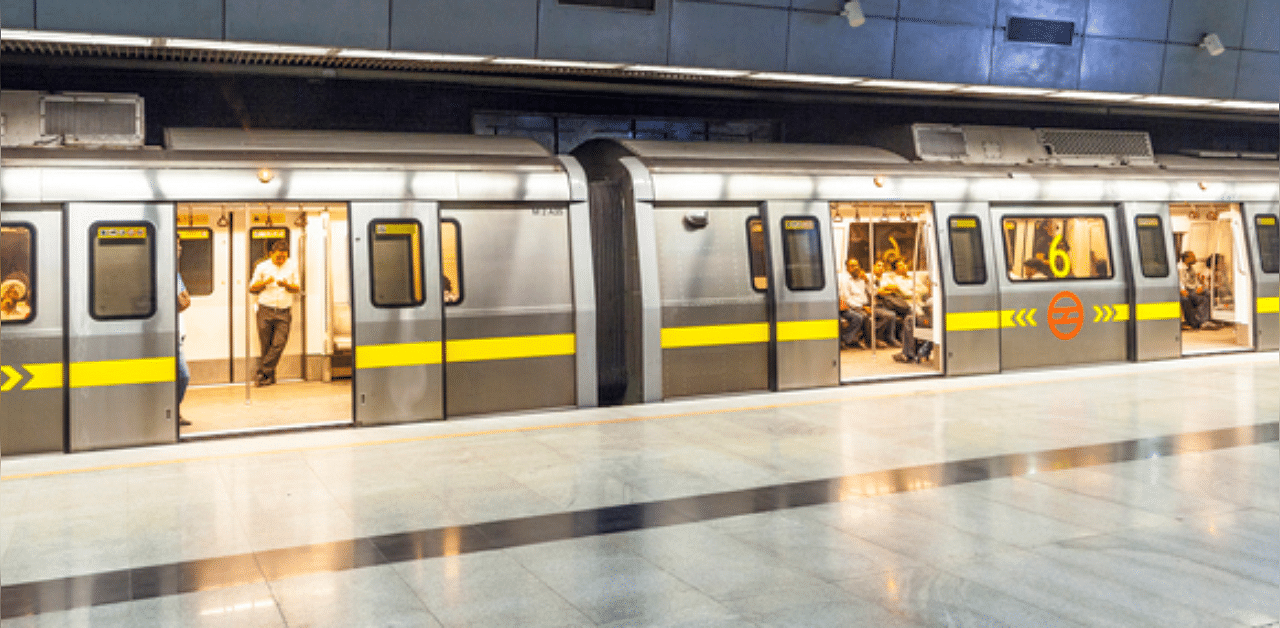
The CISF has planned an airport-like "contact-free" security check for the Delhi Metro and will deploy modified hand-held and doorframe metal detectors for scanning passengers, who will be required to put metallic objects such as belts and pens in their bags.
The security drill changes have been outlined in the CISF’s 'business continuity plan' for the Delhi Metro which resumes its services from Monday in a "staggered" manner.
Before Covid-19 struck, CISF personnel, who guard the metro network, spread over 230 stations, used to scan passengers from proximity and even touch them during security checks. The passengers were also allowed to keep their wallets and belts on the body.
Officials in the paramilitary force, however, said things will change now as social distancing and other public health norms need to be strictly followed to prevent the spread of coronavirus.
As per the new 'business continuity plan' prepared by the force for resumption of the metro services, the personnel will scan commuters using a hand-held metal detector which has been attached to a lean wooden stick so that there is a safe physical distance between the scanner and the passenger.
The plan has been prepared to ensure the health and security of metro staff and the passengers are not compromised, and the rapid rail transport system, often called the 'life line' of Delhi-NCR, has a robust counterterror cover during the Covid-19 pandemic period.
"The CISF will provide an airport-like touch-free or contact-free security service at the Delhi Metro from Monday keeping in mind the anti-coronavirus spread guidelines of the government.
"Apart from enhancing the length of the hand-held metal detectors, we have also re-calibrated the doorframe metal detectors that are placed just before a commuter climbs on a small stool for their frisking," a senior officer of the force told PTI.
The Central Industrial Security Force also guards the civil airports of the country and as per protocols prevalent here, its personnel do not touch a passenger with their hands or security gadgets unless necessary.
Suspect airport passengers, however, are subjected to intense manual frisking and pat-down search.
The Delhi Metro services were suspended on March 22 in view of the coronavirus pandemic.
The operations on its 'yellow line' (Samyapur Badli to HUDA City Centre) will resume from Monday followed by other lines in a phased manner.
The CISF officer added that the doorframe detectors have been recalibrated in such a manner that they will beep along that body part where it is suspected that the passenger is carrying a metallic object.
As per the new procedures, passengers will be asked to put all the objects on their body including metallic ones like belts and pens in their bags and if someone does not have a bag they are supposed to keep them in their hands, he said.
But unlike at airports, no plastic trays will be provided to the passengers to keep their belongings for scanning, he said.
"Even after taking out all the objects, if the door-frame detector picks a beep then the passenger will again be asked to clean himself of all the items on their body and if the situation persists they will be minutely frisked by the hand-held scanner albeit from a distance and without any touch," the officer explained.
The business continuity plan of the force, that has been reported earlier, had said that "contactless frisking shall be carried out of the passengers using hand-held metal detectors at a minimum distance of 2.5 cms."
The officer said the passengers will be requested by on-duty CISF personnel to open and show the contents of their bags in case they find it suspicious even after making it pass through the x-ray scanner.
All the force personnel on duty would be wearing masks and gloves and those who frisk will also use face shields to ensure that both the jawan and the passengers are safe, he added.
Some CISF personnel will be deputed to guide passengers undertake these new drills, the officer said.
"The personnel are being provided with re-usable gloves which will be replaced after a certain cycle. All the weapons used by the personnel will also be sanitised regularly," he said.
Mobile and armed quick reaction teams of CISF commandos will patrol the station area and keep an eye on the operations from vantage positions, he said.
As per the CISF plan, physical distancing norms will be "strictly" enforced inside the station area and a two-metre distance shall be maintained between the frisking and the line-up points and one-metre between passengers waiting at the security point.
"Electronic and manual surveillance will be intensified to have close monitoring on all activities in metro premises," the plan has said.
The CISF has deployed a contingent of about 10,000 men and women personnel to guard the Delhi Metro network, except the Rapid Metro in Gurgaon.